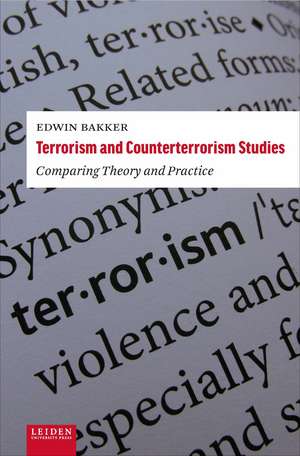Terrorism and Counterterrorism Studies: Comparing Theory and Practice
Autor Edwin Bakkeren Limba Engleză Paperback – 31 mai 2015
One of the defining issues of our age, terrorism frequently makes headlines as governments, private businesses, and ordinary citizens find themselves at risk or under attack. But what is the nature of this threat, and what can be done about it?
Terrorism and Counterterrorism Studies examines the essence of terrorism as an instrument to achieve certain goals and explores our difficulties in defining the very concept itself. The volume also provides an overview of current (counter)terrorism studies and discusses policy implications. The resulting recommendations will be valuable for limiting terrorism’s impact and reducing the threat to global peace, security, and stability.
Terrorism and Counterterrorism Studies examines the essence of terrorism as an instrument to achieve certain goals and explores our difficulties in defining the very concept itself. The volume also provides an overview of current (counter)terrorism studies and discusses policy implications. The resulting recommendations will be valuable for limiting terrorism’s impact and reducing the threat to global peace, security, and stability.
Preț: 188.60 lei
Nou
Puncte Express: 283
Preț estimativ în valută:
36.11€ • 37.21$ • 30.31£
36.11€ • 37.21$ • 30.31£
Carte indisponibilă temporar
Doresc să fiu notificat când acest titlu va fi disponibil:
Se trimite...
Preluare comenzi: 021 569.72.76
Specificații
ISBN-13: 9789087282219
ISBN-10: 9087282214
Pagini: 192
Dimensiuni: 152 x 234 x 18 mm
Greutate: 0.43 kg
Editura: Leiden University Press
Colecția Leiden University Press
ISBN-10: 9087282214
Pagini: 192
Dimensiuni: 152 x 234 x 18 mm
Greutate: 0.43 kg
Editura: Leiden University Press
Colecția Leiden University Press
Notă biografică
Edwin Bakker is professor of terrorism studies and director of the Centre for Terrorism and Counterterrorism at Leiden University, as well as a fellow at the International Centre for Counter-Terrorism in The Hague.
Cuprins
List of boxes and figures
Preface
About the author
Acknowledgements
1. Definition and nature of terrorism
1.1 Introduction
1.2 A worldwide phenomenon
1.3 A worldwide threat to security?
1.4 The use of the term terrorism
1.5 Why is there no generally accepted definition?
1.6 The need for a definition
1.7 Definition attempts
1.8 Conclusion
Bibliography
2. History of terrorism: a constantly changing phenomenon
2.1 Introduction
2.2 The first wave of terrorism: the “Anarchist Wave”
2.3 The second wave of terrorism: the “Anti-colonial Wave”
2.4 The Third wave of terrorism: the “New Left Wave”
2.5 The fourth wave of terrorism: the “Religious Wave”
2.6 A fifth wave of terrorism?
2.7 Conclusion
Bibliography
3. Terrorism studies
3.1 Introduction
3.2 The history of terrorism studies
3.3 Disciplines and approaches
3.4 Key authors and centers
3.5 Challenges and dilemmas
3.6 The current state of the art
3.7 Conclusion
Bibliography
4. Assumptions about terrorism
4.1 Introduction
4.2 Assumption one: Terrorism is caused by poverty
4.3 Assumption two: Terrorists are crazy
4.4 Assumption three: Terrorism is increasingly lethal
4.5 Assumption four: Today’s terrorism is predominantly anti-Western
4.6 Assumption five: Terrorism is successful
Bibliography
5. Assumptions and counterterrorism
5.1 Introduction
5.2 Assumption one: One can recognize a terrorist
5.3 Assumption two: De-radicalization of terrorists is possible
5.4 Assumption three: Decapitation of terrorist organizations works
5.5 Assumption four: Terrorism cannot be defeated
5.6 Terrorism can best be dealt with by way of holistic or wide approach
Bibliography
6. Future research topics in terrorism studies
6.1 Introduction
6.2 Under-researched topics
6.3 Fear and resilience
6.4 Fear and impact management
6.5 Conclusion
6.6 Reflection
Bibliography
Appendix
Index
Preface
About the author
Acknowledgements
1. Definition and nature of terrorism
1.1 Introduction
1.2 A worldwide phenomenon
1.3 A worldwide threat to security?
1.4 The use of the term terrorism
1.5 Why is there no generally accepted definition?
1.6 The need for a definition
1.7 Definition attempts
1.8 Conclusion
Bibliography
2. History of terrorism: a constantly changing phenomenon
2.1 Introduction
2.2 The first wave of terrorism: the “Anarchist Wave”
2.3 The second wave of terrorism: the “Anti-colonial Wave”
2.4 The Third wave of terrorism: the “New Left Wave”
2.5 The fourth wave of terrorism: the “Religious Wave”
2.6 A fifth wave of terrorism?
2.7 Conclusion
Bibliography
3. Terrorism studies
3.1 Introduction
3.2 The history of terrorism studies
3.3 Disciplines and approaches
3.4 Key authors and centers
3.5 Challenges and dilemmas
3.6 The current state of the art
3.7 Conclusion
Bibliography
4. Assumptions about terrorism
4.1 Introduction
4.2 Assumption one: Terrorism is caused by poverty
4.3 Assumption two: Terrorists are crazy
4.4 Assumption three: Terrorism is increasingly lethal
4.5 Assumption four: Today’s terrorism is predominantly anti-Western
4.6 Assumption five: Terrorism is successful
Bibliography
5. Assumptions and counterterrorism
5.1 Introduction
5.2 Assumption one: One can recognize a terrorist
5.3 Assumption two: De-radicalization of terrorists is possible
5.4 Assumption three: Decapitation of terrorist organizations works
5.5 Assumption four: Terrorism cannot be defeated
5.6 Terrorism can best be dealt with by way of holistic or wide approach
Bibliography
6. Future research topics in terrorism studies
6.1 Introduction
6.2 Under-researched topics
6.3 Fear and resilience
6.4 Fear and impact management
6.5 Conclusion
6.6 Reflection
Bibliography
Appendix
Index
